
In a bid to foster academic and development collaboration, a delegation from Unisa, led by Unisa's Principal and Vice-Chancellor (VC), Prof Puleng LenkaBula, embarked on a crucial visit to Yonsei University in Seoul, South Korea. The visit followed a previous engagement in October 2023, when LenkaBula led a delegation representing 11 universities from the African continent to Yonsei University. Yonsei University is one of the top-ranking universities in Asia's global rankings and notably hosts the Institute for Quantum Information Technology.
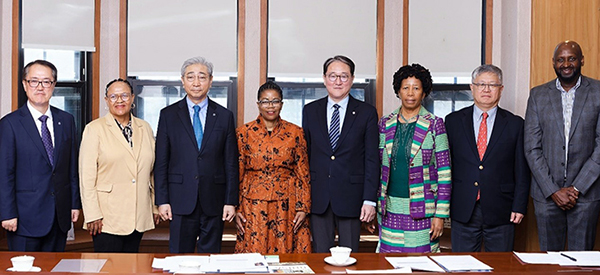
Led by Unisa's Principal and Vice-Chancellor, Prof Puleng LenkaBula, the Unisa delegation to Yonsei University in South Korea comprised (from right) Prof Tennyson Mgutshini, Executive Dean, College of Graduate Studies; Prof Madipoane Masenya (Ngwaná Mphahlele), Acting Executive Director, Office of the Principal and Vice-Chancellor; and Prof Eunice Seekoe, Distinguished Professor in the College of Human Sciences.
The Unisa delegation's visit to Yonsei University demonstrates that building bridges between institutions across continents is not just about the imperatives of academic collaboration but about fostering lasting relationships grounded in mutual respect and a shared vision for a better world. The significance of the visit lies in the potential for forging formal partnerships that transcend borders and facilitate meaningful and fruitful connections between nations. Moreover, establishing solid ties in higher education is integral to nurturing future leaders and fostering cross-cultural understanding. Through collaborative initiatives, both nations can gain invaluable insights and skills that transcend geographical boundaries. As both nations continue to strive for excellence in education, the seeds planted during the visit have the potential to yield fruitful collaboration for years to come.
The Unisa's delegation visit to Yonsei University must be considered against the backdrop of South Korea's development history. The country's remarkable recovery after the devastating war from 1950 to 1953 is an inspiring example of resilience, determination and innovation. South Korea emerged as a global, economic and technological powerhouse from the devastation and ashes of war, achieving remarkable growth and development.
The lessons gleaned from South Korea's development journey are invaluable in development contexts worldwide since they demonstrate an inspiring ascent from one of the world's poorest economies to one of the most advanced economies through strategic investment in export-oriented economic structures, education, infrastructure, health care and technology. By studying South Korea's success story, countries can draw critical insights into strategies for rebuilding and advancing socio-economic development. Against the backdrop of South Korea's remarkable journey from post-war ruin to economic and technological marvel, Yonsei University stands as a testament to the nation's dedication to excellence and innovation. Moreover, South Korea's emphasis on excellence, efficiency and effectiveness, epitomised by institutions like Yonsei University, provides a compelling model for fostering innovation in a rapidly evolving global landscape.
Conversely, while South Korea excels in technological innovation and infrastructure, valuable lessons can be gleaned from South Africa's experience in higher education, particularly in the realm of open distance and e-learning. Unisa's pioneering efforts in leveraging technology for education, coupled with its commitment to social justice, shared growth, inclusivity and accessibility, offer valuable insights for South Korea. With a robust open, distance and e-learning tradition, Unisa has developed innovative online platforms catering to diverse learners across diverse contexts. Collaboration between South Korea and South Africa in this domain holds immense potential for mutual learning and advancement in the fields of education, technology, and online learning.
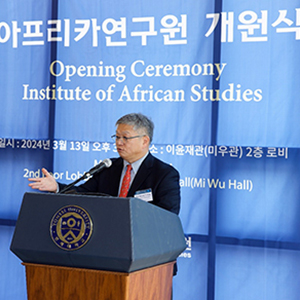
Prof Samuel Y Pang, Director of the Institute of African Studies at Yonsei University in South Korea.
South Korea's technological advancements and resilience in the face of adversity complement South Africa's rich tapestry of knowledge and expertise in higher education and sustainable development. South Africa's experience addressing inhuman development challenges precipitated by colonisation, apartheid, deepening inequalities, and corruption emphasises the importance of adaptable and resilient education praxis that defies the chronicles of destruction to confront arrested development, socio-economic disparities, and infrastructure gaps resolutely.
The visit was marked by a series of engagements that began on 13 March 2024, when the delegation met with distinguished Yonsei University leaders. This included the newly appointed 20th President of the university, Prof Dong-Sup Yoon; Provost, Prof Young-Jong Sohn; Senior Vice-President for Administration and Development, Prof Yongho Kim; Director of the Institute of African Studies, Prof Samuel Y Pang; and Vice- President for International Affairs, Prof Yong-Chan Kim. At this meeting, the university president, Yoon, shared the university's ethos, philosophy and vision, and declared Yonsei's commitment to collaborating with Unisa in pivotal areas of higher education and development.
Amidst mounting local and global healthcare challenges, the need for collaboration in healthcare becomes paramount. Unisa's Catalytic Niche Areas include Medicine/Health Studies; for this reason, a critical area of engagement between Unisa and Yonsei University was health care and medical sciences. By strengthening ties in higher education and healthcare, South Korea and South Africa can pool resources, share best practices and contribute to advancing global health outcomes.
The collaboration between Unisa and Yonsei University marks a significant milestone. Together, the esteemed institutions will explore a ground-breaking initiative to establish a Unisa Hospital, leveraging state-of-the-art medical technologies and services to address the healthcare needs of our country. Drawing inspiration from the renowned Severance University Hospital at Yonsei University, a case study in excellence and innovation, this collaboration seeks to share best practices in healthcare delivery, patient care and medical education. The Severance Hospital's holistic approach, which integrates cutting-edge medical technologies with compassionate and patient-centred care, exemplifies excellence for healthcare institutions. By studying Severance Hospital's case study, Unisa can glean invaluable insights into effective strategies for healthcare delivery, interdisciplinary collaboration, and the integration of technology into medical education and practice. This collaboration promises to advance healthcare outcomes in South Africa and South Korea. It serves as a testament to the transformative power of international partnerships in addressing complex societal challenges.
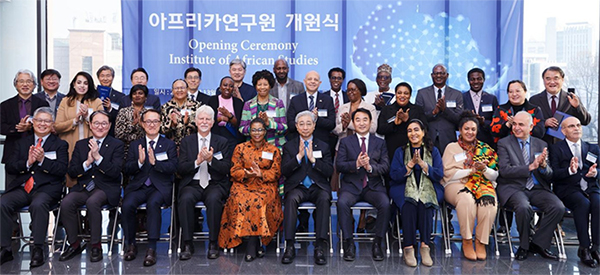
Principal and Vice-Chancellor of Unisa, Prof Puleng LenkaBula, and President of the Yonsei University, Prof Dong-Sup Yoon (centre seated), with Yonsei University leadership and Ambassadors from various African countries at the launch of the Institute of African Studies.
The visit represented a pivotal step in Unisa's broader internationalisation agenda, which aligns with its vision of being the African university shaping futures in the service of humanity. The Unisa delegation was honoured to participate in the historic/herstoric launch of the Institute of African Studies at Yonsei University. The Institute of African Studies is a Yonsei University research institute that seeks to deepen ties between South Korea and African nations through research.
The guest of honour at the event was LenkaBula, who delivered the much-anticipated keynote address. Members of the diplomatic corps, government, industry leaders, academics and students were in attendance. The strong presence of the African ambassadors at the launch of the Institute of African Studies revealed a deepening relationship between Africa and Asia. At the launch, the Unisa delegation interacted with students from diverse African countries who are studying at Yonsei University.
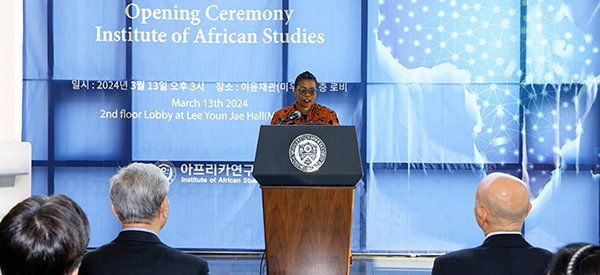
Principal and Vice-Chancellor of Unisa, Prof Puleng LenkaBula, delivering the keynote address at the opening of the Institute of African Studies at Yonsei University in Seoul, South Korea.
Unisa and Yonsei University are committed to advancing sustainability outcomes across economic, environmental and social spheres. Yonsei University hosts innovative programmes and initiatives that include the Global Engagement and Empowerment Forum on Sustainable Development (GEEF), co-hosted by the Institute for Global Engagement and Empowerment (IGEE), the Ban Ki-moon Foundation for a Better Future, and the Ban Ki-moon Centre for Global Citizens. The GEEF programme serves as a platform for dialogue and action on pressing global challenges. By convening world leaders, policymakers, scholars and practitioners, GEEF facilitates discussions and exchange of ideas to find holistic and sustainable solutions to complex development issues. The Unisa delegation participated in the 2024 GEEF, where all stakeholders, including global leaders and development experts, convened to critically examine progress towards the United Nations' 2030 Agenda for Sustainable Development.
At GEEF 2024, LenkaBula, joined by the Ambassador of the United Republic of Tanzania to the Republic of Korea, HE Togolani Edriss Mavura formed part of a high-level panel with the theme titled Calling for Transformation: A Critical Evaluation from the Majority World. Pang hosted the panel.
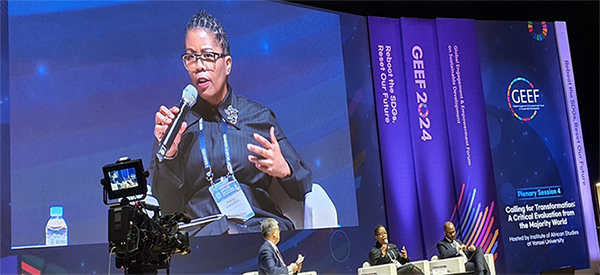
Unisa's Principal and Vice-Chancellor, Prof Puleng LenkaBula, joined by the Ambassador of the United Republic of Tanzania to the Republic of Korea, HE Togolani Edriss Mavura, in a high-level panel with the theme: Calling for Transformation: A Critical Evaluation from the Majority World. Prof Samuel Y Pang, the Director of the Yonsei University Institute of African Studies, hosted the panel.
LenkaBula offered a critical exploration into the efficacy of the SDGs in the context of the African continent and the "majority world". She discussed vital reasons why a reboot of the SDGs is essential. She emphasised that development disequilibrium on the continent was precipitated by systemic effects of coloniality, corruption and the continual depletion of African resources by the "minority world", making the realisation of the SDGs within the UN's ambitious target of 2030 highly challenging. She cautioned against the insidious development discourses that defame Africa amidst the concurrent and incessant grabbing of Africa's resources.
She stressed that the SDGs must be explored in context and that a 'one size fits all' approach to development is ill-advised. She then discussed the African Union's Agenda 2063 action plan, which was formed at the Organisation of African Unity/African Union 50th anniversary celebration in Ethiopia in 2013. African leaders pledged to accelerate growth, development and prosperity on the continent from now on to 2063 – a more reasonable target date given the development losses that took place because of the lingering legacies of coloniality, the Covid-19 pandemic, and other more recent continental and global setbacks.
LenkaBula shared that Unisa is a public example of an adaptation and resilience community. As the largest university on the continent, the university encourages robust, strategic, government, industry and civil society partnerships for engaged knowledge production and knowledge mobilisation, development problem identification, solutions ideation, solutions implementation and impact assessment. Unisa designs engaged courseware, curricula and research that enables students and staff to contribute meaningfully to a more sustainable society. The Unisa epistemic community fosters sustainability across diverse disciplines and development sectors and equips leaders to create a more just and sustainable society.
In 2024, Unisa will host 150 engaged scholarship projects working with diverse communities of shared place and purpose to address critical national, continental and international development challenges. Unisa positions its intellectual capacity toward the world's development challenges while advancing and enhancing scholarship that valorises the pluri-versality of development knowledge.
A special highlight of the delegation's visit to Yonsei University was the GEEF24 dinner attended by former Secretary-General of the United Nations, Ban Ki-moon. Engaging with a distinguished leader who continues to advocate for a better, more sustainable world was an honour. Ban Ki-moon's presence served as a reminder of the lifelong commitment to development and the importance of using one's voice to champion positive change. It became evident that development is not confined to a single project or initiative but is a continuous journey towards a more just and equitable future. His unwavering dedication to addressing global challenges inspired GEEF 24 participants to redouble efforts in advancing sustainable development and promoting international collaboration for the betterment of humanity.
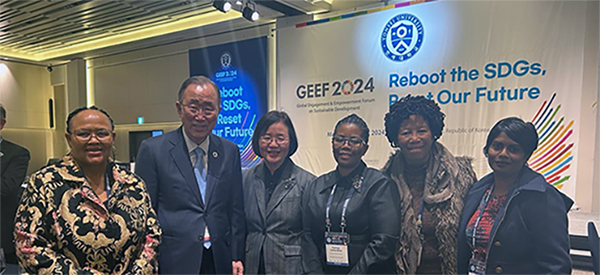
Unisa delegation with Ban Ki-moon, 8th Secretary-General of the United Nations, and celebrated theologian Prof Chung Meehyun.
The visit to Yonsei University provided a multifaceted understanding of the complexities and opportunities in our globalised world. As we navigate the challenges ahead, collaboration, compassion and a holistic approach to development are essential in building a more sustainable and equitable future for generations to come.
Through the visionary leadership of Unisa's Principal and Vice-Chancellor, Prof Puleng LenkaBula, and her unwavering commitment to positioning Unisa as a global leader in higher education, social justice and development, we can look forward to an era of deepened global impact, widened reach and robust bilateral and multilateral relationships that produce the thinking and action needed for the current global context and its future.
Publish date: 2024-04-11 00:00:00.0